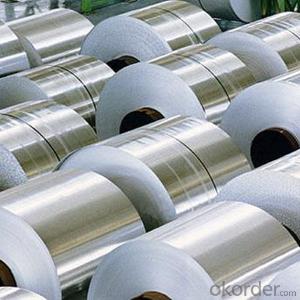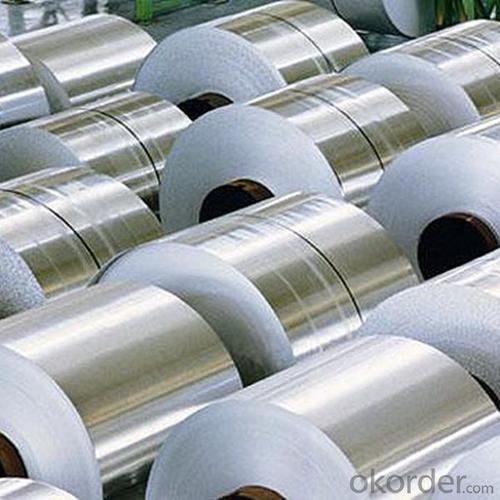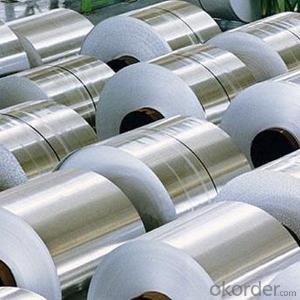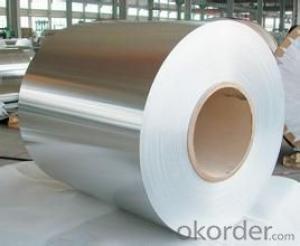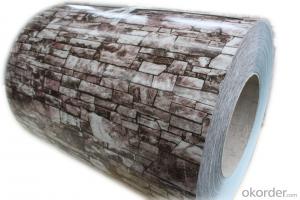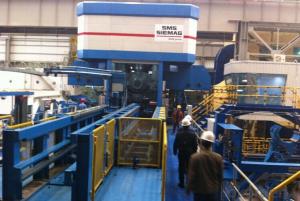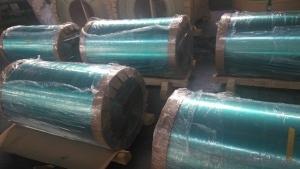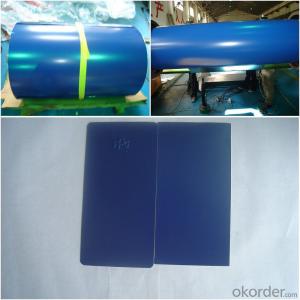Blue Aluminum Roofing Coils - Thin Aluminum Coil Alloy for Foil Stock
- Loading Port:
- Shanghai
- Payment Terms:
- TT OR LC
- Min Order Qty:
- 5 m.t.
- Supply Capability:
- 10000 m.t./month
OKorder Service Pledge
OKorder Financial Service
You Might Also Like
Specification
1. Specification of Thin Aluminum Coil Alloy used for Foil Stock
characteristics | Application |
1) Super peeling strength | 1) Building exterior curtain walls |
2) Excellent surface flatness and smoothness | 2) Decoration and renovation additions for old buildings |
3) Superior weather, corrosion, pollutant resistance | 3) Decoration of interior walls, ceilings, bathrooms, kitchens and balconies |
4) Even coating, various colors | 4) Shop door decorations |
5) Fireproof, excellent heat and sound insulation | 5) Advertisement board display platforms and signboards |
6) Superior impact resistance | 6) Wallboards and ceilings for tunnels |
7) Lightweight and easy to process | 7) Industrial materials, materials for vehicles and boats |
2. Application of Thin Aluminum Coil Alloy used for Foil Stock
(1).Interior: wall cladding, ceilings, bathrooms, kitchens and balconies, shutters, doors...
(2).Exterior: wall cladding, facades, roofing, canopies, tunnels,column covers , renovations...
(3).Advertisement: display platforms, signboards, fascia, shop fronts...
3. Feature of Thin Aluminum Coil Alloy used for Foil Stock
*Such coil is specially designed to replace aluminum ingot, due to the high export tax of aluminum ingot, the coil has better price than ingot.
*This type of coil can fit customer's remelting furnace just like ingot, no need to make any change to the production line that was previously used for ingot. The standard coil size and weight is very suitable for the feed gate of furnace.
*This type of coil causes less material wastage than ingot when remelted.
*Our coil is made directly from ore, no need to go though the ingot making process, quality is much better than other suppliers who use ingot scrap to make coil.
Be free from Oil Stain, Dent, Inclusion, Scratches, Stain, Oxide Dicoloration, Breaks, Corrosion, Roll Marks, Dirt Streaks and other defect which will interfere with use
4. Certificate:
SGS and ROHS(if client request, paid by client), MTC(plant provided), Certificate of Origin(FORM A, FORM E, CO), Bureau Veritas and SGS (if client request, paid by client), CIQS certificate
5. Image of Thin Aluminum Coil Alloy used for Foil Stock
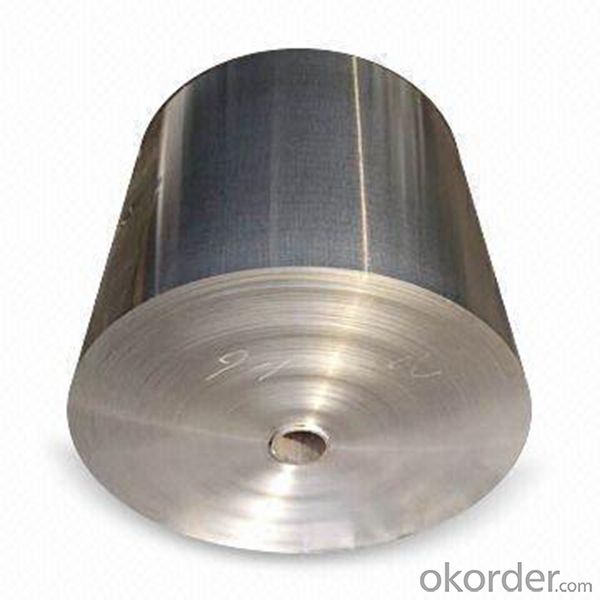
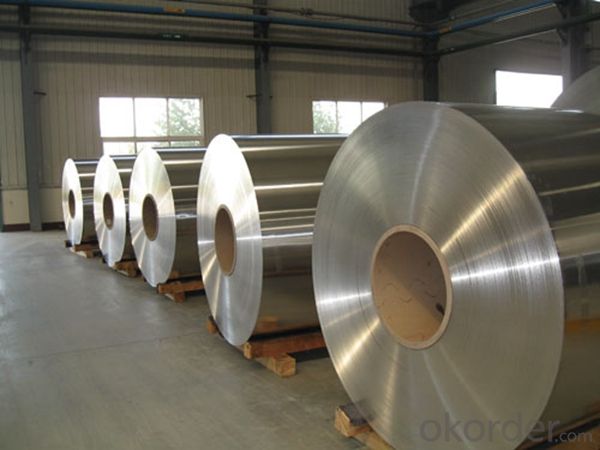
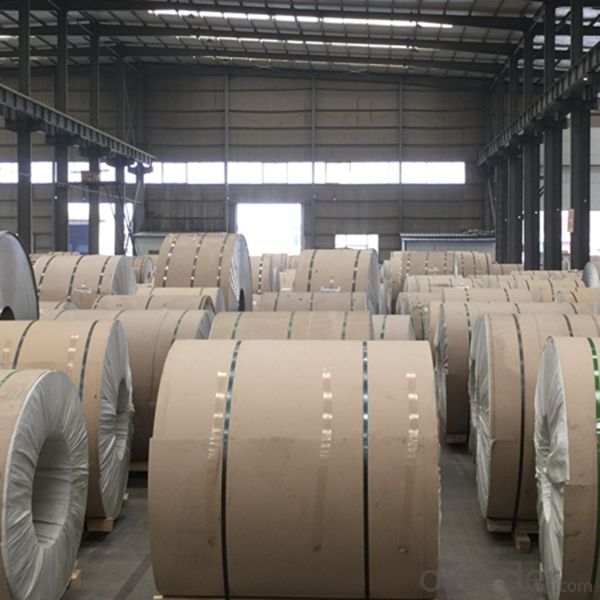
6. Package and shipping of Thin Aluminum Coil Alloy used for Foil Stock
eye to wall
eye to the wall
with wood pallet (wooded case also available)
7. FAQ
1) What is the delivery time?
Dpends on actual order, around 20 to 35 days
2)What is the QC system:
We have QC staff of 20 persons and advanced equipment, each production is with MTC traced from Aluminum ingot lot.
3) What market do you mainly sell to?
Australia, America, Asia, Middle East, Western Europe, Africa etc
- Q: I am wondering if a deodorant made with aluminum silicate is safer than one with aluminum salt.
- aluminum silicates have been used in deodorants for years. there was a time when it was thought that the Al in the deodorants was causing alzheimers but that has been shown to be wrong. if there are other dangers to the silicates, we haven't found them or they aren't that bad
- Q: Can aluminum coils be used in the production of consumer goods?
- Consumer goods production can indeed make use of aluminum coils. Aluminum, being a versatile and lightweight material, presents numerous benefits in the manufacturing of consumer goods. Its remarkable resistance to corrosion makes it particularly suitable for products that are exposed to moisture or outdoor conditions. Moreover, aluminum coils offer easy formability and shaping capabilities, enabling efficient production processes and customization. The utilization of aluminum is widespread in consumer goods like kitchen appliances, automotive components, packaging materials, and electronic devices. Manufacturers seeking to produce long-lasting and top-notch consumer goods find aluminum's properties to be an optimal choice.
- Q: Can aluminum coils be used in electrical transformers?
- Electrical transformers can indeed utilize aluminum coils. Although copper is typically the preferred material for transformer windings, there has been a growing trend towards utilizing aluminum due to its cost-effectiveness and lighter weight. Distribution transformers, which are smaller in size and operate at lower voltages, often employ aluminum coils. However, it is important to consider certain factors when using aluminum coils in transformers. Aluminum has a lower conductivity than copper, necessitating larger cross-sectional areas for the aluminum coils to compensate for this difference. Furthermore, aluminum has a higher coefficient of thermal expansion compared to copper, requiring proper precautions to accommodate the differential thermal expansion between the aluminum windings and other transformer components. In conclusion, aluminum coils can be suitable for specific transformer applications, but it is crucial to meticulously execute the design and manufacturing process to ensure optimal performance and reliability.
- Q: i need ONE advantage of each, and a final reason why aluminium is used?
- Copper does conduct slightly better than aluminum, but aluminum corrodes over time and the oxidized surface has very high resistance. Copper also oxidizes but is not as high a resistance. The high resistance, when in contact with another conductor, like a junction inside a box, will create heat. Those high resistance junctions create so much heat that over time a fire hazard develops. Hence, National Electrical Code disallowed the use of aluminum for safety reasons.
- Q: Can aluminum coils be used in low-friction applications?
- Low-friction applications can indeed make use of aluminum coils. Aluminum, being a lightweight and corrosion-resistant material, exhibits excellent thermal conductivity. These characteristics render it suitable for a variety of applications that prioritize low-friction. The automotive, aerospace, and HVAC industries often employ aluminum coils in heat exchangers, evaporators, condensers, and cooling coils. These coils are specifically designed to efficiently transfer heat while minimizing friction and energy loss. Furthermore, aluminum coils find utility in electrical motors, generators, and transformers, where smooth operation and reduced energy consumption are vital. Additionally, the lightweight nature of aluminum contributes to overall system weight reduction, thereby increasing efficiency. Moreover, various types of machinery and equipment that necessitate low friction, such as conveyor systems, sliding mechanisms, and bearings, can benefit from the utilization of aluminum coils. Aluminum's low coefficient of friction enables smooth and efficient movement, minimizing wear and tear on components. In conclusion, aluminum coils offer versatility in low-friction applications due to their lightweight, corrosion-resistant, and thermally conductive properties. Incorporating these coils can result in improved energy efficiency, reduced maintenance costs, and enhanced performance across a wide range of industries.
- Q: How are aluminum coils joined in a continuous process?
- Various techniques, including welding, brazing, and adhesive bonding, are utilized in the continuous process of joining aluminum coils. Joining aluminum coils through welding is a widespread method. It involves melting the coil edges and subsequently merging them. This can be accomplished through different welding processes, such as TIG welding, MIG welding, or laser welding. These welding methods establish a sturdy and long-lasting bond between the coils. Brazing is an alternative technique employed for joining aluminum coils. It entails heating the coils and utilizing a filler material with a lower melting point than aluminum to create the joint. The filler material, typically a brazing alloy, is applied to the joint area. Upon heating, it liquefies and flows into the gap between the coils, creating a solid bond as it cools. Adhesive bonding is also employed during the continuous joining of aluminum coils. This approach involves applying a specialized adhesive or glue to the coil surfaces that require joining. The adhesive is chosen meticulously for its exceptional bonding properties with aluminum. The coils are then pressed together, and the adhesive undergoes curing, resulting in a robust and dependable bond. Each joining technique possesses distinct advantages and is selected based on factors such as application requirements, the aluminum type used, and the desired level of strength and durability. The choice of joining method in a continuous process relies on the specific demands of the production line and the final product.
- Q: Is it possible to utilize a press machine to bend aluminum coils?
- <p>Yes, you can use a press to bend aluminum coils. Presses are versatile machines capable of bending various materials, including aluminum. However, it's crucial to select the appropriate press type and size for the specific coil dimensions and desired bend. Additionally, ensure the press has the necessary tonnage to handle the bending force required for aluminum. Using the right dies and lubrication can also improve the bending process and prevent damage to the coils. Always follow safety guidelines and consult with equipment specifications to ensure the press is suitable for bending aluminum.</p>
- Q: I bought some cheap aluminum foil, but one weighs much less than the other brand for the same thickness and length, why?What is the other made of? Is it still good to use for grounding something?Thank you.
- Aluminum foil is aluminum foil, it has nothing but aluminum in it. One of them is misstating the thickness, or you are mistaken about the weight or width.
- Q: Relevant question 5Excuse me, what's the meaning of your "deoiling effect"? And you answer two kinds of performance, my understanding is that the oil removal effect is not good, lead to aluminum volume is not neat, what is the difference between the two? Solution, thank you
- when this phenomenon occurs in feeding occurs when you say the phenomenon, when parking tension shock or mutation, the inner drum contraction material, inner sleeve trace diameter decreases, emergency stop when the inertia torque increase, will influence on the oil film, and is the inner bag sleeve is not tight, causing the inner diameter decreases due to aluminum transfer from the inner ring to slide staggered, outer ring, the outer ring can be transferred to the volume of the material into a neat is not neat, not fully delivered appeared loose layer.
- Q: Can aluminum coils be used for solar panel applications?
- Yes, aluminum coils can be used for solar panel applications. Aluminum is a lightweight and durable material that is commonly used in the construction of solar panels. It is an excellent conductor of electricity, making it ideal for capturing and conducting solar energy. Aluminum coils can be used as a backing material for solar panels, providing structural support and helping to dissipate heat. Additionally, aluminum has good corrosion resistance, which is important for solar panels that are exposed to various weather conditions. Overall, aluminum coils are a popular choice for solar panel applications due to their strength, conductivity, and resistance to corrosion.
Send your message to us
Blue Aluminum Roofing Coils - Thin Aluminum Coil Alloy for Foil Stock
- Loading Port:
- Shanghai
- Payment Terms:
- TT OR LC
- Min Order Qty:
- 5 m.t.
- Supply Capability:
- 10000 m.t./month
OKorder Service Pledge
OKorder Financial Service
Similar products
Hot products
Hot Searches
Related keywords
